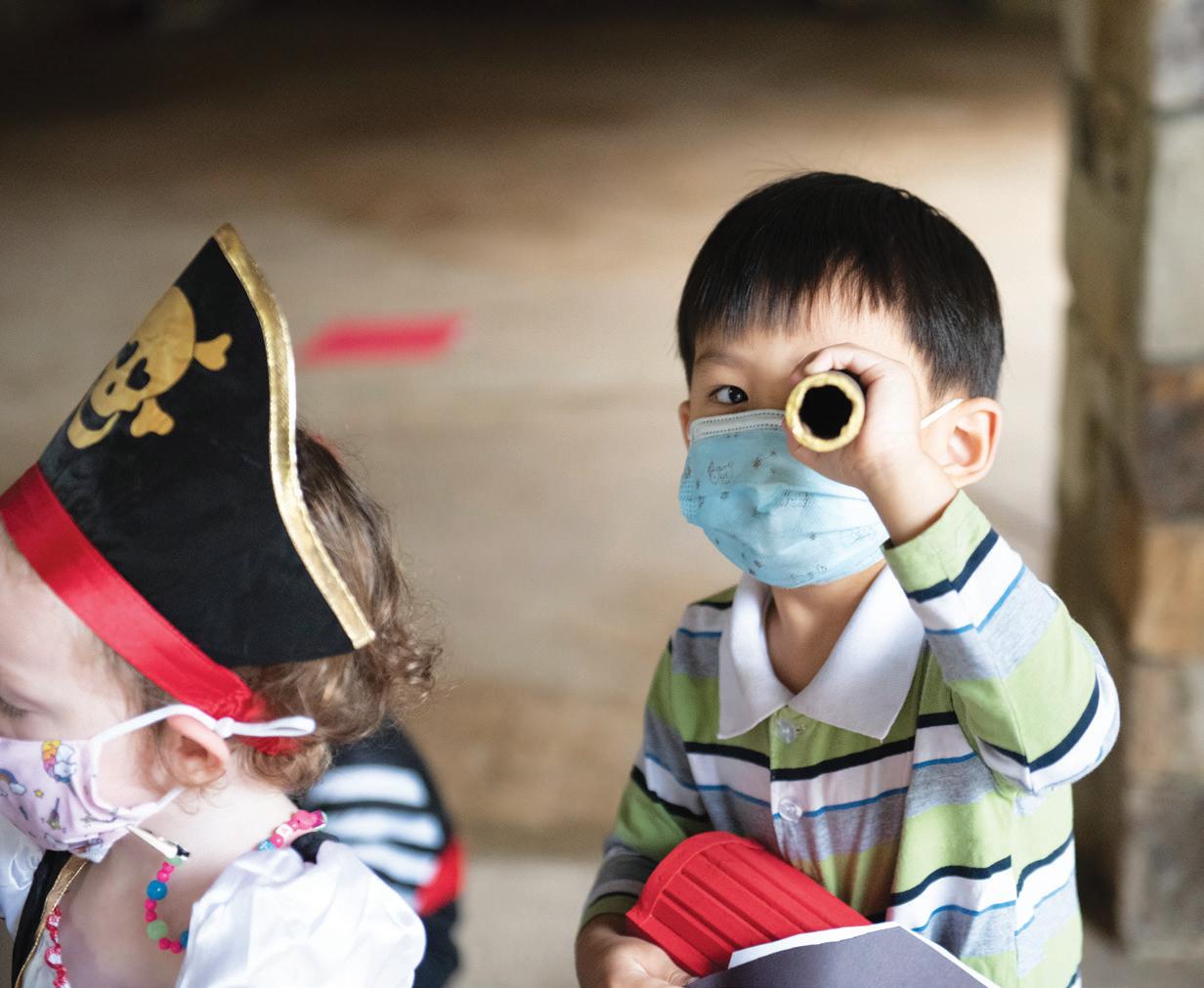
1 minute read
Trinity through a photographer's lens

Trinity through a photographer’s lens
By Stephanie Selman, Associate Communications Manager
As Trinity’s day-to-day photographer, I often see beautiful, meaningful moments that would go unnoticed otherwise. And from everything I have seen, it is clear that our students are taught not only academics, but also what it means to be empathic, respectful, inquisitive, appreciative, and grounded humans. Join me on a photographic journey of some of my favorite captured moments this school year.


Students are able to be themselves, have joyful and fun learning experiences, and just enjoy being a kid. Trinity understands the importance of encouraging ageappropriate play and how play is quintessential to learning.

Observing students working in groups or simply out on the playground, you can see leaders emerging. They are stepping up, communicating with others, and finding common ground among their peers.



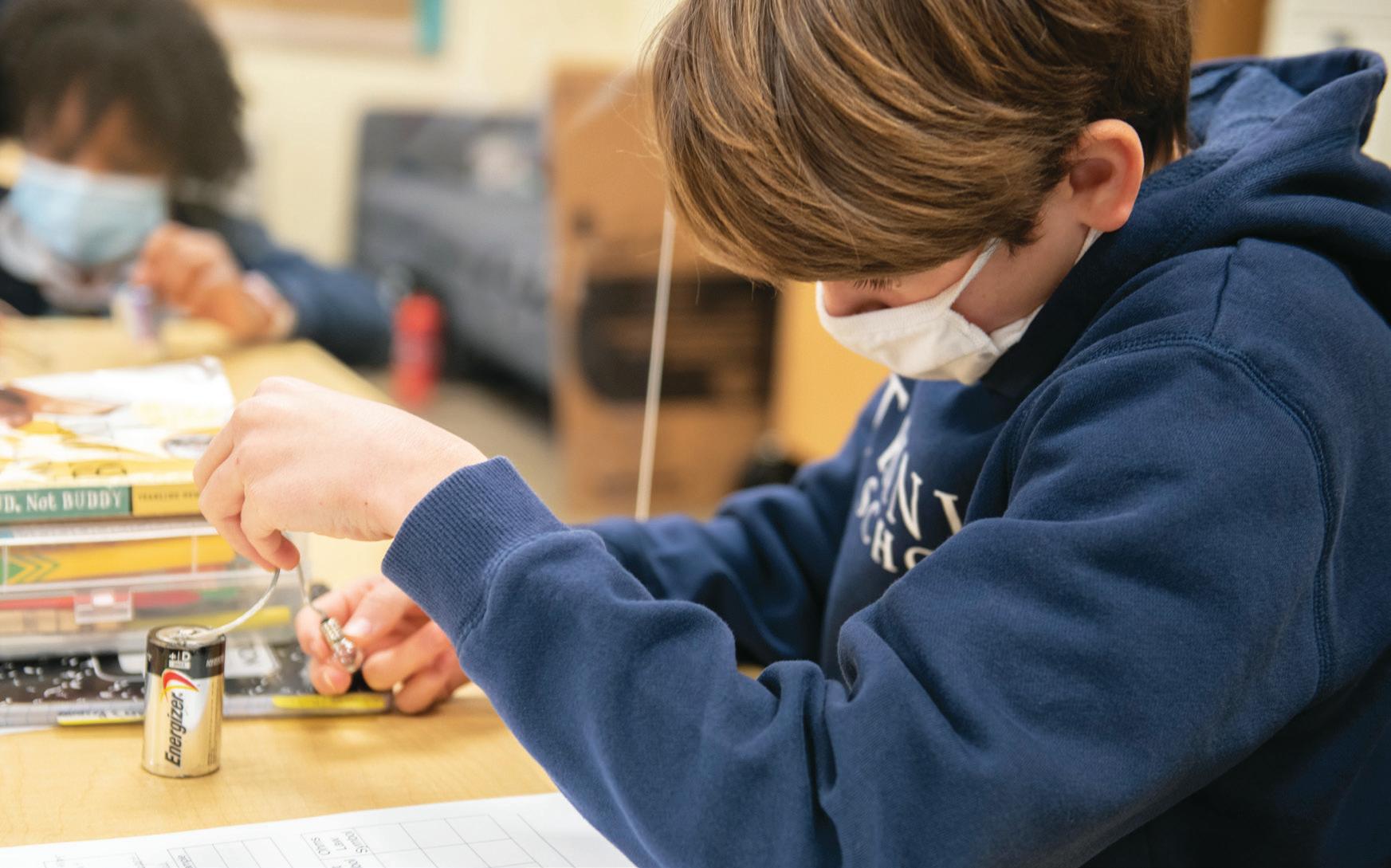
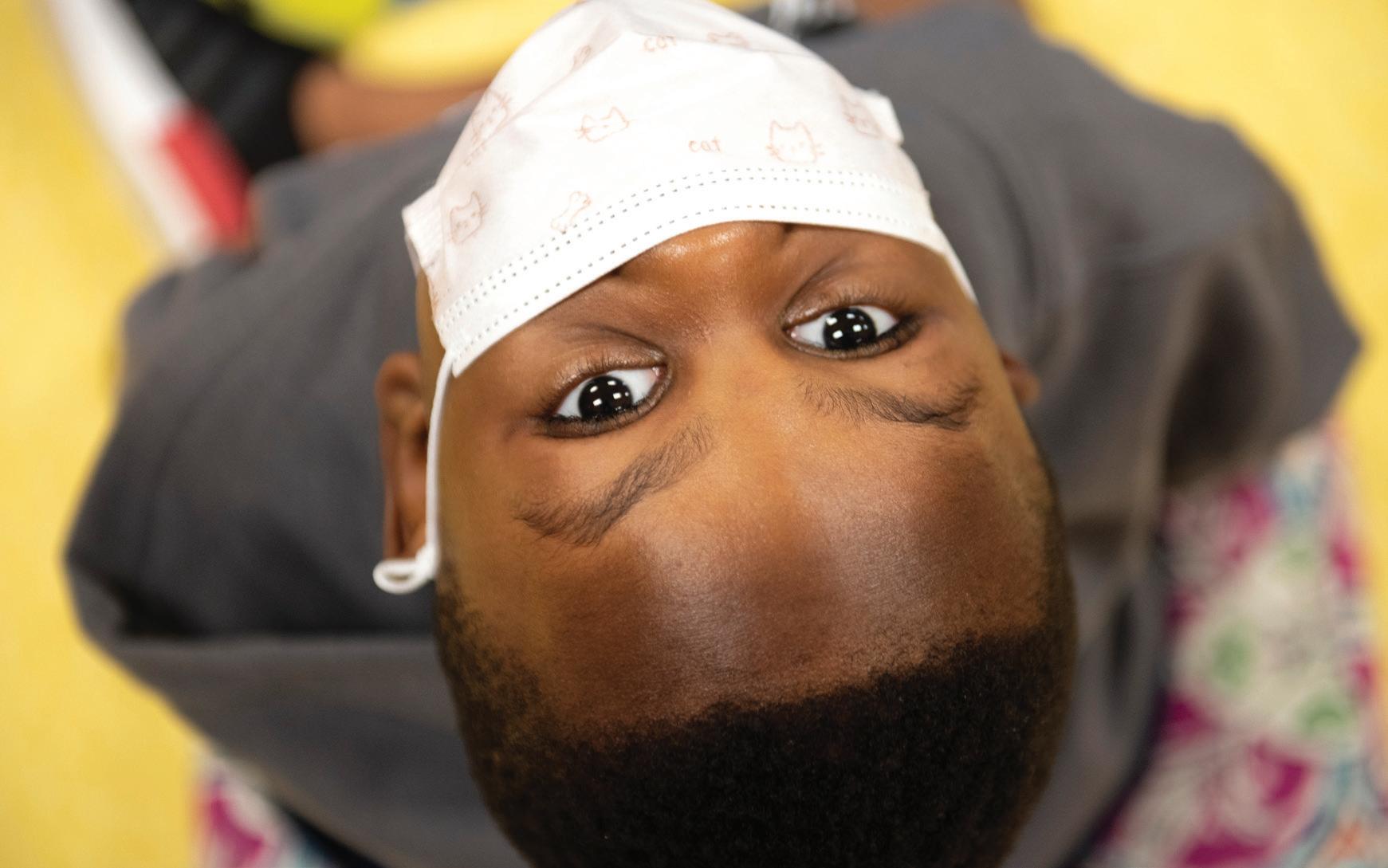
It is natural for students to be curious, and Trinity encourages students to ask questions, nurturing a genuine progression of investigating ideas. Teachers always allow time for students to wonder, enjoy hands-on experiences, and explore their surroundings.

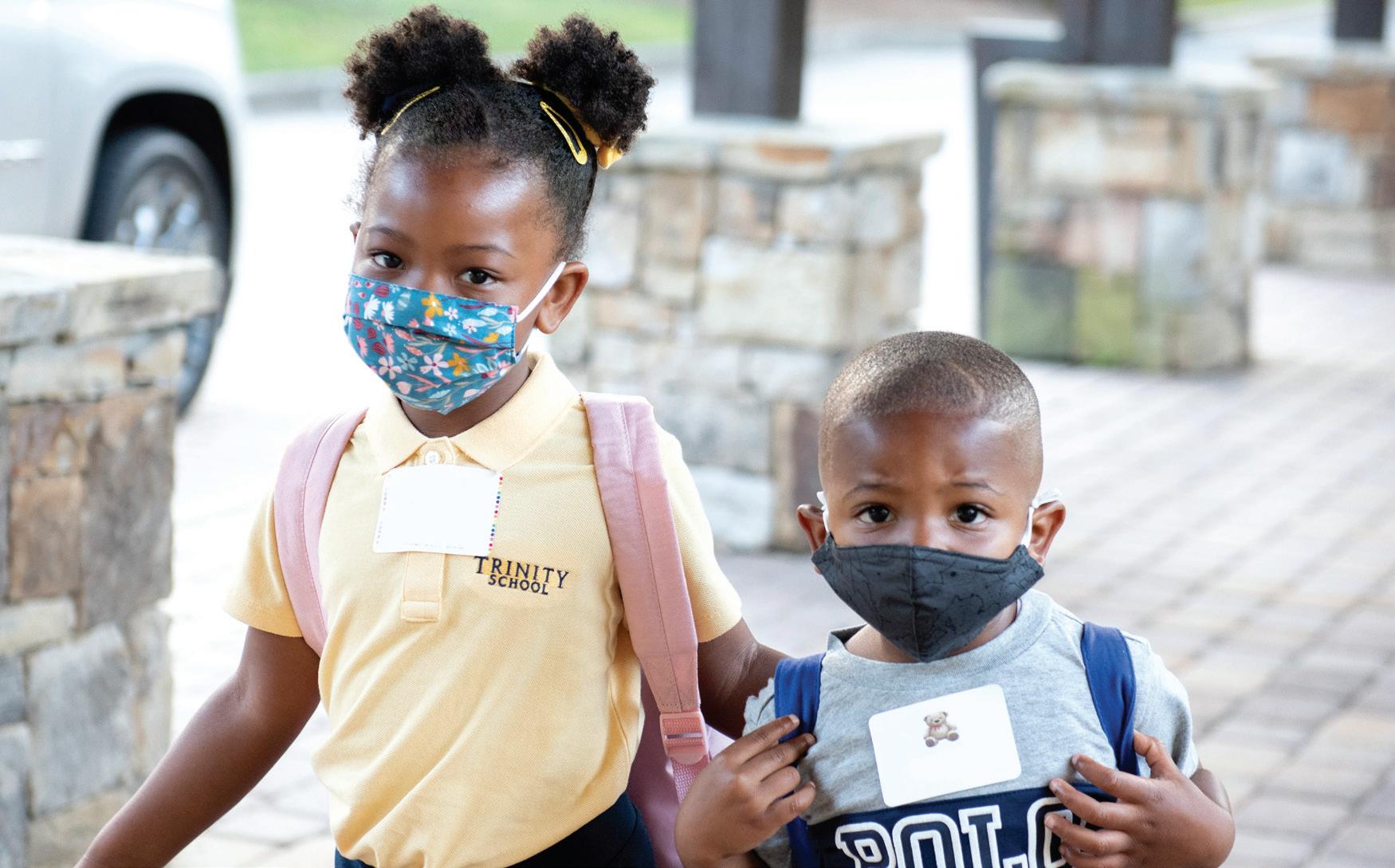




Trinity students care for each other deeply. You can feel the sense of family among our community. Students always lend a helping hand to their classmates. They work together to ensure all of their peers succeed.

Trinity’s balanced and well-rounded approach to elementary education grows equally strong academic and character foundations in our students. Every day, I look forward to capturing the special moments that exemplify the School’s mission in action as each student “develops the knowledge, skills, and character to achieve his or her unique potential as a responsible, productive, and compassionate member of the School and greater community.”

Staff Story: Director of Operations Reginald Haley
By Nicole Fash, Director of Marketing and Communications
Like everything he does, Reginald Haley recollects the experiences that led to his current position at Trinity calmly and with purpose. He intersperses his stories with humor and one can expect to hear a pearl of wisdom every time he begins a sentence with the idiom, “To make a long story short.” The irony is that you cannot sum up Trinity’s straight-forward and practical director of operations in a few words, or even 2,000. His life journey has been anything but ordinary and is a study in hard work, determination, curiosity, and creativity. Since he was a child, Reginald has seized opportunities and made the most of difficult situations and grown from them. He was born and raised in Detroit, Michigan, which he says is a wonderful place, though it has its challenges. “I love Detroit, but while I was there it was badly impacted by crime, and the motor industry and the jobs that were tied to it went away,” Reginald says. “My family was just me, my dad, my mom, and my older brother. We were a very loving, supportive, tight-knit family. My parents were very encouraging, and we had strong family values. “I think without that base, I could have had a lot of issues,” he continues. “The way my dad put it, ‘I know it’s not easy to go to school and run into some good and not-so-good people. When you come home, it is a place of comfort and peace, a refuge. Leave all that at the door; you are loved here.’ Many people don’t experience that kind of support. I had loving parents, not wealth, and I wouldn’t flip it around.” A shy child, Reginald was always a tinkerer. His dad, who worked on train lines and was a steel mill worker, taught his sons that they should be able to do something with their hands.
“I was the kid who would take your clock apart and try to put it back together,” says Reginald. “My father was mechanically minded, and whether it was working on cars with him or repairing our furnace, I was always shadowing him. I grew up in a 100-year-old house, so there was always something to fix.” When Reginald was in the Fifth Grade, his family was notified that the elementary school was going to become a night school for adults because of budget cuts. He was forced to move to an elementary school in another district for his Sixth-Grade year. When his father passed away suddenly of a heart attack, Reginald’s mom decided to place Reginald in a private school for middle school, and he began his Seventh-Grade year at an archdiocese school that served children through Eighth Grade. “She wanted to make the best decisions for me and didn’t want me in a public middle school,” says Reginald. “I didn’t want to go to a private school because I was used to public school; it was a very different environment. I had a rough first year because I was in a fog as I grieved for my father. I loved science, math, and shop and tried to be a good student. A turning point was when my English teacher, who was also the librarian, assigned me a report on the Dewey
decimal system. I did really well on it because of the way she encouraged me to write reports and learn more about processes. This increased my interest in science and the technical arts even more, and after a time, I was able to get my legs under me and enjoyed my experience there.” Later, after one year at a private high school, which also had to close due to lack of funding, Reginald returned to public school for his sophomore year, moved briefly to Atlanta, then finished his high school career at another public school back in Detroit.
The loss and upheaval that Reginald experienced during his childhood taught him how to be flexible and persevere. “I never felt like I was being wronged,” he says. “I told myself that I was going to take each situation and stand on it. I felt like I was being formed, and I was not going to complain about what was going on. High school taught me how to be nimble and was a blessing in disguise. Because I was forced to go to so many schools, I didn’t have the peer pressure or running with the wrong crowd that others experienced. In the end, I was trying to check all the boxes so that I could become a functioning adult.” After high school, Reginald worked for two years as a bank guard at First Independence Bank, the only African American-owned bank headquartered in Michigan. His position allowed him to observe all the employees and customers, and he remembers incredible inspiration and encounters along the way. “It was encouraging to watch the bank president go up to his office every day and see all the leadership in Detroit, whether it was the mayor or a commissioner,” he says. “I really appreciated the daily ‘hey, young man’ conversations. My biggest moment there occurred one day after I was told to lock the exit doors, leave the side door open, and post myself there because we had one more customer. I watched a courtesy vehicle pull up with Rosa Parks inside. She came in, and I didn’t know what to say, but I couldn’t not say anything. So, I said, ‘Ms. Parks, how are you? I really don’t know what to say. All I can say is thank you.’ She said, ‘You can tell me your name, young man.’ That is how humble she was. I told her my name, and she shook my hand. That is something I will never forget; what a brave person.” Along the journey to discover his passions, Reginald spent a year-and-a-half at the Center for Creative Studies in Detroit exploring music theory, vocal performance, and piano while he worked at the bank. He decided he didn’t want to major in music and became interested in real estate. With minimal opportunities available in Detroit, and with a goal “to find himself,” Reginald relocated to San Jose, California, where the real estate market was booming at the time. For two years, he worked at San Jose Arena, first as an usher, then a building engineer, then a security guard. In addition to experiencing the excitement of meeting basketball greats like Kobe Bryant, Kevin Garnett, and Shaq, Reginald learned a lot in the fast-paced, high-turnover world of hospitality. He became curious about the role of an operations director after watching how his boss led the staff. “I have always been observant and try to identify people I can model based on their good behavior,” he says. “My boss, the director of operations, would take about 200 staff members into the fishbowl before every event. He would section us off, give a debrief about what the evening was going to look like, then walk out. I admired his communication skills when talking to all the different groups. He was a no-nonsense, matter-of-fact guy who got results and motivated people. I became interested in operations, about how he could have such a wide skill set, and it always stuck with me.” Following his time at the arena, Reginald briefly held a position as a security guard at an outdoor mixed-use property, then spent six years pursuing his new interest in operations at a 20-acre, 410-unit resort that had tennis courts and three Olympic-sized pools. He handled all facets of property management, “from door to desk” as he puts it, working his way up to evening property manager. During those six years, Reginald’s career pursuits also took him down the path of modeling, then acting. “I was a shy kid, not one who would speak in public,” he says. “But I realized how inhibitive that would be for my growth. Modeling was a way to rip the Band-Aid off and get that nervousness out of the way while making money. It’s a tough industry. The people at the go-sees pick you apart. I was told that my ears are too big, my features are too soft, and that I was too tall for modeling.” Standing at 6’4”, Reginald was undeterred and told by an agent that he should pursue acting with his “boy-nextdoor” look. He gave it a shot and immediately began making traction, accepting small acting roles and landing some modeling jobs along the way. Reginald joined the Screen Actors Guild - American Federation of Television and Radio Artists (SAG-AFTRA) and some highlights during this time were landing a bit part on Nash Bridges that was cut at the last minute, modeling in a national Levi’s ad, performing as Will Smith’s body double in the Just Cruisin’ music video, and being Tiger Woods’s hand model in a national Wheaties commercial.
Reginald’s acting and modeling career began to taper off and he returned to music, putting another iron in the fire alongside property management. Playing the piano and writing songs had continued to be hobbies since his time at the Center for Creative Studies in Detroit, and he had a sound studio in the extra bedroom of his apartment. He and a friend began writing songs together and ended up forming the band W.E., which stands for West and
East, with three other performers. Instead of seeking representation, Reginald formed Diversity Records, an independent record label that managed W.E. and two other artists. From hobbyist to artist to record label owner to artist representative, Reginald’s reignited passion led him to working as the associate producer of the California Music Awards. In the early 2000s, he booked everyone for the event, from Green Day to Smash Mouth, and W.E. was the opening act. The brightest spot for him though was jamming with Sammy Hagar and other musical legends at the end of the show.
As his professional pursuits were taking off, so was Reginald’s personal life. He met his now-wife, Samantha, in 1996, and they married in 2000. The following year, they welcomed their son, Reggie. The cost of living in California and the birth of his first child made Reginald evaluate his career trajectory, and he decided to turn music back into a hobby and solely pursue operations. He became certified in HVAC and became a Certified Technology Specialist (CTS) in AV Design and Installation. With his hours reduced at the resort property due to budget cuts, Reginald took on a second job in property management. In 2004, when Reggie was three years old and Samantha was pregnant with their second child, a daughter named Carmen who was born in 2005, the couple decided to move to Georgia to find a better work-life balance and settle down. After interviewing with two companies, Reginald ended up moving into the world of independent schools, accepting a job as director of facilities and property at Holy Spirit Preparatory School in Atlanta. He worked there for eight years, adding teaching to his resume during his second year, when the school’s leadership asked him to teach audio production, technical theatre, and intellectual property classes because of his music and acting background. Later, he built a recording studio and radio station at Holy Spirit and became the station’s faculty advisor. “I never expected to be a teacher,” says Reginald. “And for someone who teeters on the edge of stage fright, I was intimidated to teach teenagers. What I had to remember was that I was sharing my knowledge base from reallife experiences. It also helped that these classes were electives, that they chose to be in them; it was a passion they were pursuing.” Reginald continued to pursue his own passions while at Holy Spirit. During his first year there, he received a call from New York to see if he and his former bandmates would like to perform on amateur night for the legendary variety show Showtime at the Apollo. While they didn’t win, what an incredible reunion and final performance together for W.E. Also while at Holy Spirit, Reginald earned his Global Designation in Facilities Management in 2008. His drive to learn and grow has continued since he joined the Trinity team as our director of operations in 2012. In the last several
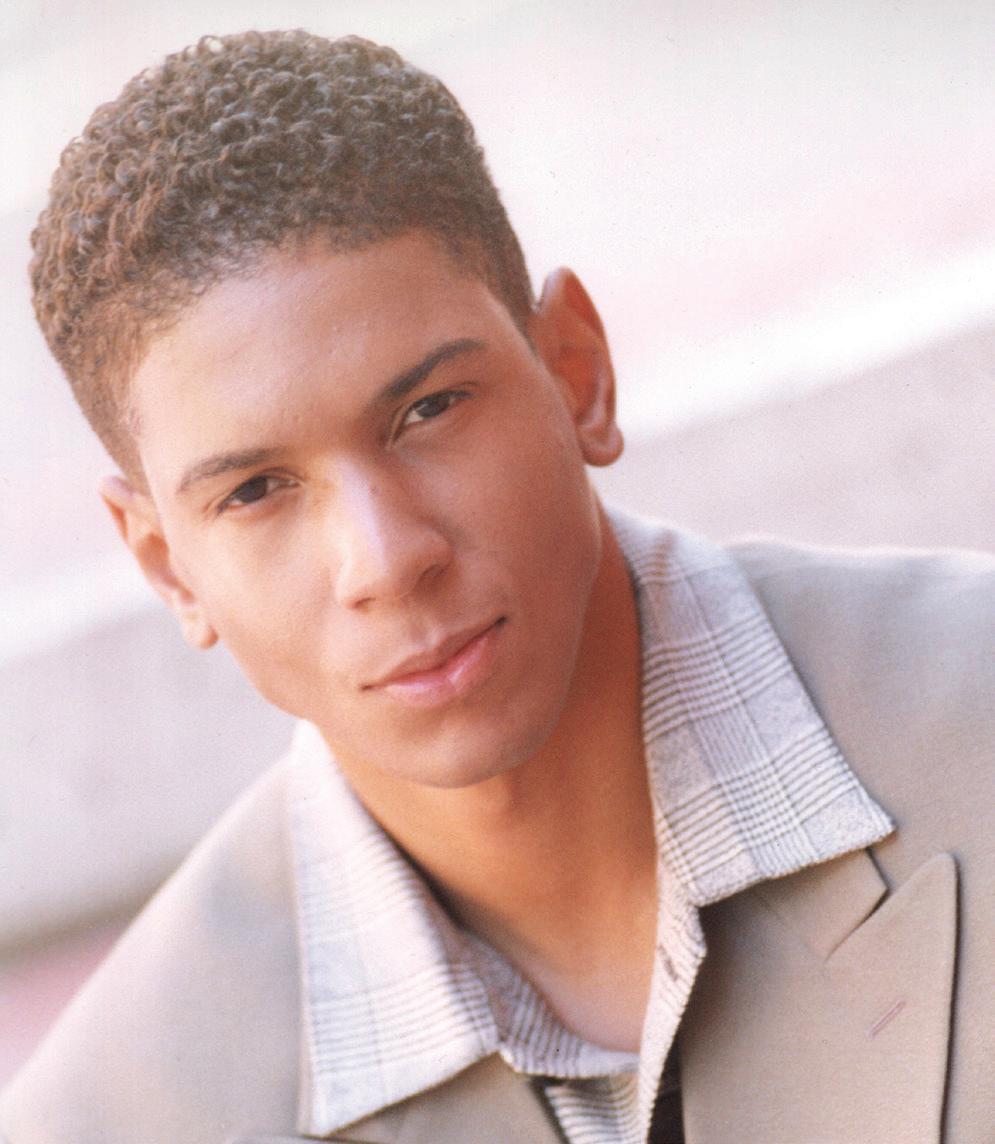
Taken in 1996, this photo was one of many that Reginald took to modeling go-sees. Reginald poses with his family in 2019 during his son Reggie’s induction into the Eta Sigma Alpha National Honor Society. Reggie was president of Georgia’s Upsilon Omicron Chapter.

years, he has earned a degree in business administration from Southern New Hampshire University and is close to earning his interdisciplinary degree in leadership through the University of Massachusetts Amherst. In 2018, he graduated from the FBI Citizens Academy and now serves as an ambassador for the FBI in the fi ght against terrorism and crime.
Reginald is Trinity’s fi rst full-time operations director— the role used to be shared by Trinity’s director of fi nance and an assistant head of school—and he has enjoyed building the role from the ground up. He oversees food services, facilities, health services, transportation, and safety and security. At one time, he oversaw Extended Programs. He is responsible for staffi ng all service departments, ensuring compliance with federal, state, and local authorities. He works with parent volunteers on sustainability education and projects throughout the year. He authors and implements non-academic policies that support the business and human resource departments. Reginald’s role has become even more important since the onset of the pandemic. “I am the kind of person, in the fabric of my being, who likes challenge,” he says. “That is what motivates me here at Trinity. What an incredible responsibility to be here and create the pandemic section of our crisis plan, a section that hopefully no one will ever have to use again.” When asked why he wanted to work at Trinity, Reginald based his decision to come here on his experience with private schools as a child. He stays because of the warm culture and the challenge of a dynamic and professional organization. “The best school experience I had was during my Seventh to Ninth Grade years, which were at private schools,” he says. “I always wanted to give back to an organization that refl ected those wholesome and nurturing times. I also saw Trinity as an opportunity to apply and strengthen my talents and skills. I feel like my work is making an impact on the future leaders of society. I’m inspired by the energy I see in the students at Trinity, their innocence and curiosity give me so much joy. “I always want to be in a growth pattern,” he continues. “And I want to help the people around me to do the same. Trinity has a great balance between tradition and forward thinking; I really like how everyone is always contemplating how to be current and advance the School. It is a ‘we’ mentality, not an ‘I’ mentality. We exude excellence. We do what we say we are going to do, and we are always improving. I really like the work style and culture. We are all linked by arms: we win together, we lose together, and we look forward together. We have a collaborative thought process and realistic expectations for results. We get the support and resources we need to execute our responsibilities and programs.” So, what does the future hold for Reginald as he closes in on a decade of service to Trinity School? In addition to continuing to work at Trinity, he is interested in independent fi lmmaking, and Reginald is using his professional-grade, in-home recording studio to begin collaborating with a former client on producing another album. Family continues to be Reginald’s priority. He and his wife, Samantha, live in Acworth with their daughter, Carmen, as well as Reginald’s mom and Samantha’s mom. Their son, Reggie, is a sophomore physics major at Cornell University. “I’ve been in search of being a whole person my whole life, to be the best person that I can be,” Reginald says. “As you can clearly tell, I have not had a traditional experience with much of anything, and I am hoping that my next 50 years much of anything, and I am hoping that my next 50 years will be at least as interesting as the fi rst half.”
Fun Facts about Reginald Haley
Favorite food Tie between fi sh and chips and Coney Island hot dogs Favorite band Run-DMC
Secret talent Audio production, sound mixing, and indie fi lmmaking Words of wisdom for Trinity students Be you, and always be diff erent. Favorite movie and TV show 12 Angry Men (1997 version) and The Americans
Favorite book The Blue Book of Building and Construction On his bucket list Traveling through Europe, Africa, and Asia
Spotlight on Art: a year in review
By Leisy Ruddock, Director of Spotlight on Art and Special Events
For all of us, this year was about adapting in the face of new circumstances. Spotlight on Art 2021 was no exception! After making the difficult decision to cancel the Artists Market and Gala, we made sure these necessary changes did not deter us from keeping Spotlight on Art top of mind through smaller campaigns and fundraisers throughout the school year. Although this year was not what we planned for initially, I am so proud of our flexibility and creativity. We kicked off the school year by launching an online spirit wear store. Everyone was excited to be back on campus and show off their school spirit by wearing their new gear on Spirit Days and other non-uniform days! From Trinitybranded face masks and water bottles to sweatshirts and the ever-popular tie-dye shirts, items did not stay in stock for long. The Spotlight season continued with our annual Neiman Marcus Pop-Up Gallery. Held from October 3–November 5, 2020, the gallery featured a curated selection of artwork from four preeminent contemporary artists: Kayce Hughes, Kellie Lawler, Colleen Leach, and Millie Sims. This was the seventh year that Neiman Marcus graciously provided this opportunity at no cost to Trinity. We are very appreciative of our longstanding partnership with Neiman Marcus. The highly anticipated Holiday Pop-Up Shop moved online for the first time this year. The virtual shop ran for a full week during November Conferences and showcased
In September 2020, First Grader Warner models some of Trinity’s latest spirit wear.

Contemporary artist Kellie Lawler’s paintings were featured at this year’s Neiman Marcus Pop-Up Gallery, which opened on October 3, 2020.

artwork and home goods from some of Spotlight’s favorite artists. In addition, the Pop-Up Shop included the third annual Trinity ornament, which featured artwork by Ali Leja, and poinsettias for the second year in a row. Thinking way outside of the box, we introduced the Spotlight pARTner Card, a fundraising initiative that took place in lieu of the canceled Artists Market. From January 25–30, card purchasers received 20 percent off artwork at four preeminent art galleries in Atlanta: Atlanta Artist Collective, Buckhead Art Company, Gregg Irby Gallery, and Huff Harrington Art. The pARTner Card was a great way for Spotlight patrons to support local art galleries and Spotlight artists during the week that the Artists Market was supposed to take a place. In addition, all card proceeds benefi ted Trinity School. In place of the annual Gala and Auction, we hosted a successful and exciting online auction. Comprised of donations from Spotlight on Art’s top-selling vendors from the Artists Market, the online auction featured beautiful art, items for the home, and jewelry. In addition, a few of the highly coveted Trinity Treasures were made available for bidding. I would be remiss if I did not take the opportunity to show my sincere appreciation for this year’s Spotlight on Art leadership team, who helped provide insight and guidance in executing these smaller fundraising events. I am looking forward to working alongside each of them next year when Spotlight on Art comes back bigger than next year when Spotlight on Art comes back bigger than ever for our 40th anniversary!


Spotlight artist Ali Leja’s commissioned Trinity Tiger was featured on the 2020 Trinity ornament during the Holiday Pop-Up Shop in November. From January 25–30, the Spotlight pARTner Card allowed its holders to receive 20 percent off at our four pARTner galleries: Atlanta Artist Collective, Buckhead Art Company, Gregg Irby Gallery, and Huff Harrington Art.

In mid-February, Conference Room C turned into a makeshift gallery to allow individuals to view auction artwork in person, including Missy Maude’s “Lunch at the Club,” Christy Coole’s “Home Bound,” Mark Boomershine’s “May Abundance Flower,” and Stewart McDonald’s “Like a Trap Door in a Canoe.”










